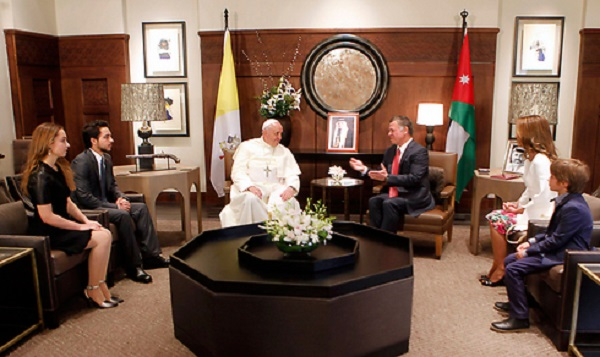King Abdullah II of Jordan has praised Pope Francis’ much-debated remarks about the limits to free speech, and insisted that religious beliefs must not be offended.
“King Abdullah made explicit reference to the words expressed by the pope on the fact that freedom of expression is a right, and in some cases even a duty, but at the same time it has limits, and cannot offend the religious beliefs of others. The monarch defined these considerations positive,” said Archbishop Maroun Lahham, patriarchal vicar for Jordan of the Latin Patriarchate of Jerusalem, as reported by Fides News Agency on Thursday.
Pope Francis said last week that freedom of speech must be protected, but there should be limits when it comes to causing offense to religions.
His comments reflected on the controversy surrounding French satirical newspaper Charlie Hebdo, which suffered a deadly shooting where 12 people were killed earlier in January for publishing drawings of the Islamic prophet Muhammad.
“There are so many people who speak badly about religions or other religions, who make fun of them, who make a game out of the religions of others,” Francis said.
To illustrate his point, the Vatican leader jokingly said that he would punch his aid, Alberto Gasparri, if he were to insult his mother.
“They are provocateurs. And what happens to them is what would happen to Dr. Gasparri if he says a curse word against my mother. There is a limit.”
Francis’ comments were criticized by some in the Christian community, including former CNN host Piers Morgan, who said it was difficult to believe that the Roman Catholic Church leader suggested he would punch someone out of retaliation.
British Prime Minister David Cameron added that while he would feel offended if someone insults Jesus, the right to do so is defended by free speech laws.
“If someone says something offensive about Jesus, I might find that offensive, but in a free society I don’t have a right to wreak my vengeance upon them,” Cameron said.
“We have to accept that newspapers, magazines can publish things that are offensive to some as long as it’s within the law.”
King Abdullah has condemned Islamic extremism, and said that people who carry out attacks, such as the one at the news office of Charlie Hebdo, do not represent true Islam. At the same time, he has said that the reputations of Muslims must be defended and protected. The King of Jordan was one of 40 world leaders who marched in Paris to show solidarity against terrorism. President Barack Obama did not join the march in Paris.
After Charlie Hebdo featured a drawing of Muhammad in its first edition after the terror attack, King Abdullah slammed the decision as “an insult to the feelings of Muslims everywhere.”
It was an “irresponsible, reckless and thoughtless act,” he added, and said that one of the fundamental principles of freedom of expression was “respect for religions instead of deliberate insults.”
Other political leaders from Muslim nations have echoed these sentiments, including Turkey’s Prime Minister Ahmet Davutoglu. He said following the Paris attacks that drawings of Muhammad would not be tolerated in his country.
“Freedom of the press does not mean freedom to insult,” Davutoglu said, though he clarified that he condemns terrorism.
“We do not allow any insult to the prophet in this country,” he added. “As the government, we cannot put side-by-side the freedom of press and the lowness to insult.”



